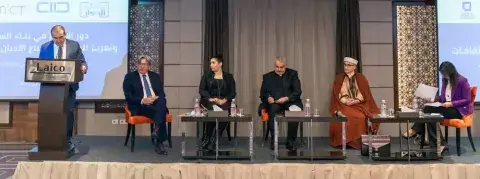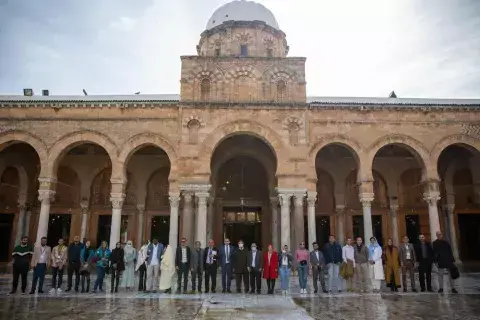Saudi journalist Suzana Aldosary knows her job requires the ability to deliver messages of tolerance and acceptance.
This is why she travelled to Tunisia to take part in a training from the recently launched Media for Peace programme, led by KAICIID’s Arab region programme, in partnership with German organisation Media in Cooperation and Transition (MiCT).
The four-day workshop, held in Tunis on February 17 - 20, gathered 28 journalists from 12 Arab countries, who were selected to take part in the Dialogue Journalism Fellowship, a programme organised by KAICIID and MiCT under the umbrella of the Interreligious Platform for Dialogue and Cooperation in the Arab Region.
“I learnt that being a journalist is about peace”. Aldosary said after completing the workshop, which is the first of three to be held throughout the fellowship programme.
The training aimed to provide the young journalists, mostly between 30 and 35 years of age, with skills related to intercultural dialogue, conflict resolution and media ethics which they will be able to use in their daily work.
According to Maya Sukar, KAICIID’s capacity building consultant in the Arab region, a training programme on dialogue targeting journalists in the Arab region became necessary after the uprisings and conflicts following the outbreak of the Arab Spring between 2010 and 2011. After that, Sukar said, unethical reporting on religion and ethnicity has triggered unpleasant consequences.
“The double-edged power of media has raised the question of whether journalists have done more harm than good in covering conflicts in the Arab region,” Sukar said.
“Reporting on religion and ethnicity in a conflict-sensitive area such as the Arab region requires commitment and support by journalists advocating for common values and countering the spread of ignorance, intolerance and hatred.”
The workshops included in the fellowship programme are designed to improve journalists’ understanding of conflict analysis and of the role of interreligious diversity in promoting peacebuilding within the region. More specifically, they counter biased journalism and its implications, develop dialogue techniques, and provide participants with a safe space to share experiences and knowledge about their work reporting on religion and conflicts.
“We realised that there was a gap within the media world. A lot of programmes talk about how to fact-check and counter misinformation, but none of them actually targets very specifically interreligious dialogue” said MiCT’s project manager Christa Waegemann".
“In developing this programme and designing the trainings we purposely wanted to set up a toolkit so that fellows will walk away being able not only to understand fact checking and ethical journalism, but also knowing how to approach the topic of interreligious dialogue within the Arab region.”
A panel of religious leaders and media experts addressed the Fellows during the first workshop. Father Rifaat Bader, director of the Jordan-based Catholic Center for Studies and Media and IPDC founding member, explained that learning to use the media as a tool to achieve peace and cohesion rather than conflict and division will be particularly important in the aftermath of the COVID-19 pandemic, which has increased socio-economic differences and tensions.
“Inside the mass media there is an angel and there is a devil, so let’s amplify the voice of the angel,” he said.
“We have a great opportunity now, after the pandemic, to adopt a more human voice and dialogue to solve problems and promote solidarity.”

According to Bassel Al Torjoman, a journalist from Independent Arabia who was also among the panellists, programmes such as Media for Peace will have a positive impact on the future of the Arab region.
“The job KAICIID does is not just for today,” he said. “TV, radio and all media are key to building our future in a logic of living together. Nothing is more important than working for the future.”
Participants in the programme come from different countries and religious backgrounds, reflecting the diversity of the Arab region.
Among them, Moroccan TV presenter Mantanna Maalaynine was motivated to join the programme since she considers interreligious dialogue as a critical topic that widens a new horizon for coexistence between nations and civilizations.
“I have applied for this programme because interfaith dialogue is very important,” she said. “Today I have learnt a lot in the workshop.”

Between the second and the third training, the journalism fellows will receive a small grant to implement initiatives aiming to promote the use of dialogue as a tool for peacebuilding in the region.
A Media Policy Forum is expected to be launched in the coming months as a second element of the Media for Peace programme. It is expected to provide a space for collaboration between religious leaders, editors and the fellows, and to produce a Charter for peace media in the Arab region.